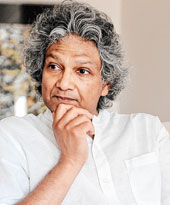 |
| Romesh Gunesekera at the Apeejay guesthouse off Park Street. Picture by Rashbehari Das |
Romesh Gunesekera, the Sri Lanka-born English author, debuted as a writer with a collection of short stories titled Monkfish Moon. In 1994, his first novel, Reef, was shortlisted for the Booker Prize. The 59-year-old was in Calcutta
recently to conduct a creative writing workshop along with author
Amit Chaudhuri. Metro caught up with the soft-spoken writer to talk about his latest book, The Prisoner of Paradise [Bloomsbury, Rs 550], on how Calcutta took his breath away and why he doesn’t watch cricket anymore.
How would you introduce The Prisoner of Paradise to a reader?
It’s the story of a young girl who goes from England to Mauritius in 1825, at a time when Mauritius was very, very different from the Mauritius of today. Because this was before the very large migration of indentured labour from India. It was when the British had just taken over from the French. Sugar plantations were started, there were African slaves on the plantations but what is very little known is there were Indian slaves too, sold from Calcutta and Bombay. The British also brought prisoners from India and a small number from Sri Lanka — criminals as well as political prisoners.
So my story is really about this girl Lucy Gladwell coming to Mauritius from England and about her meeting these political prisoners and her relationship with one of the interpreters, a young man called Don Lamboder.
The book is about exploring the confluence of different cultures, which is something that Mauritius is celebrating now but it is also essentially a love story or a story of love.
Who is the reader of this book?
The reader is somebody who likes to read fiction. Doesn’t really matter where they are… actually it doesn’t even matter when they are. People who read fiction are different from other people, because they are people who are interested in an imagined world. And whether they are Indian, Sri Lankan, English, French, Russian, American or Egyptian, if they are readers, they have more in common with other readers than they do with anybody else.
Sri Lanka features in all your novels. Is it a conscious decision or the land of your birth just creeps in?
Yes, it does feature in most of my books! I’m interested in exploring these stories. But it’s not always conscious. Sri Lanka is a part of my background, it’s not where I live but it’s what I want to explore. And I find it works very well to explore through fiction. Sometimes it’s through the land, sometimes through the characters… and in the case of my new novel, it’s through Sri Lanka’s history.
There was one book though, that didn’t mention Sri Lanka: Heaven’s Edge. It’s a dystopian novel set in the future on an island. But then most people said Sri Lanka is an island too (smiles)!
The Match is based on cricket. Are you passionate about the game? What about the IPL?
Well, yes, cricket is very important in that book. It does explore some ideas about cricket but it is exploring really the notion of identity. I must say when I was writing the book (2002 to 2006) I was hugely involved with the game. But I can no longer keep up with it. In these last 10 years, cricket has become quite different. I know there’s a big thing happening (IPL-6) but it’s not just the IPL, cricket has become a 24/7 game. Earlier it used to be seasonal. And I find, for me, 24/7 cricket is very unrestful (smiles).
Which book has had the biggest impact on you?
Well obviously my first novel [Reef] had the biggest impact on my life. It got me a readership, it was unexpectedly successful. It changed me. It allowed me to be a writer.
When did you know you would become a writer?
I don’t think I knew I would be a writer. I wanted to become a writer and I tried to write.
What would you be if not a writer?
What would I be or what would I like to be? Well, I’d like to be a musician. But I don’t think I would have been a musician. I’d probably be an artist of some sort. I do a little bit of sketching, painting.
Your literary influences?
Lots. For example Gabriel Garcia Marquez’s One Hundred Years of Solitude. Though I don’t write anything like that… I don’t write magic realism.
A place that took your breath away?
At the moment, Calcutta. I’ve been here now for eight days and I feel very comfortable here. I like it very much. I like the pace of things. I like the fact that I can walk around, though I have not walked around too much. But I’ve walked up and down Park Street a LOT (from his Rawdon Street accommodation to Oxford Bookstore). I like the way people are easy to talk to. And the sense of history, culture that around.
And how did the writing workshop go?
Very well. That’s another part about Calcutta that I liked. We had a very enjoyable workshop. And the people selected for the workshop were from all over — Delhi, Bangalore and also further south. And abroad — from England, Scotland.
Who should play you in a biopic?
I don’t think there ever will be a biopic on me! I would much like some of my books to be made into films. People have been trying to make a film on Reef for a long time…











